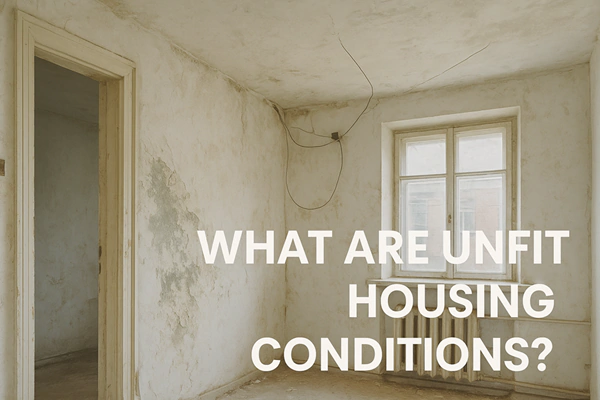Unfit housing conditions refer to properties that are unsafe, unhealthy, or unsuitable for people to live in. These homes fail to meet basic standards of health, safety, and comfort, putting residents at risk. Landlords have a legal duty to make sure rented properties are fit to live in at the start of a tenancy and remain so throughout.
What makes a property unfit to live in?
A property may be considered unfit to live in if it has:
- Serious dampness or mould that affects health or damages belongings
- Inadequate heating or insulation, especially in cold weather
- Unsafe electrical wiring, broken sockets, or exposed wires
- Gas leaks or unsafe gas appliances
- Pest infestations, such as rats, cockroaches, or bed bugs
- Structural problems, like unstable floors, broken stairs, or cracked walls
- Lack of hot water, working toilets, or washing facilities
- Poor ventilation, especially in kitchens and bathrooms without vents/extractor fans
- Fire risks, such as missing smoke alarms or blocked exits
These issues don’t just cause discomfort. Many can directly affect your health and safety. In some cases, they can also increase the risk of injury or long-term illness.
Who decides if a property is unfit?
Local councils have the authority to assess housing conditions. They use the Housing Health and Safety Rating System (HHSRS) to identify hazards in a home. If a serious hazard is found, the council can order the landlord to make repairs or improvements. In extreme cases, they may declare the home unfit to live in.
Can I report unfit housing conditions?
Yes. If you’re a tenant and your landlord refuses to fix serious issues, you can report the problem to your local council’s environmental health team. They can inspect the property and take action if needed. You should always raise the issue first with your landlord or letting agent and give them a chance to fix it.
Are landlords responsible for repairs?
Landlords are legally responsible for:
- Keeping the structure and exterior of the property in good repair
- Maintaining heating, gas, electricity, and water supplies
- Ensuring the property is free from serious damp or mould
- Fixing sanitary fittings, like toilets and basins
- Addressing issues that affect your health and safety
If your landlord fails to make essential repairs, they may be in breach of their legal duties under the Landlord and Tenant Act 1985 or the Homes (Fitness for Human Habitation) Act 2018.
What should I do if I’m living in unfit housing?
- Document the problem: Take photos and videos, and keep written records.
- Contact your landlord: Explain the issue and request repairs in writing.
- Give a reasonable timeframe: Usually 30 days, depending on the severity.
- Report it to the council: If nothing is done, contact your local authority.
- Seek legal advice: You may be entitled to compensation or legal action.
How Marley Solicitors can help with housing disrepair claims
At Marley Solicitors, we specialise in supporting tenants who are living in poor or unsafe housing conditions. If your landlord has ignored requests to carry out repairs, we can help you take legal action to protect your rights and improve your living situation.
Our housing disrepair team can:
- Assess whether your home is legally unfit to live in
- Start a housing disrepair claim on your behalf if your landlord fails to act
- Help you claim compensation for any inconvenience, health issues, or damage to belongings caused by the disrepair
We understand how stressful it is to live in substandard conditions. That’s why we offer clear, practical legal advice and act quickly to get results for your housing disrepair claim. In many cases, we can take on your case on a no win, no fee basis.
Don’t put up with unfit housing. Contact Marley Solicitors today to speak with our experienced team. We’re here to help you live safely and with dignity.


